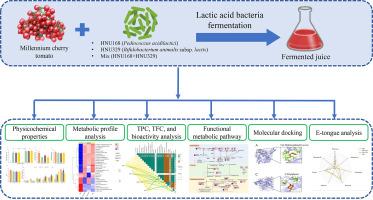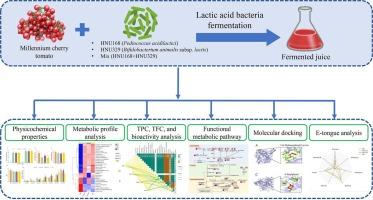利用综合分析工具表征乳酸菌发酵千年樱桃番茄汁中的代谢物和生物转化
IF 9.8
1区 农林科学
Q1 CHEMISTRY, APPLIED
引用次数: 0
摘要
乳酸菌发酵提高了食品基质的营养价值和风味。本研究探讨了动物双歧杆菌亚种酸碱性Pediococcus acidiactii HNU168的影响。乳酸菌HNU329及其在千年樱桃番茄汁(MFJ)上的联合发酵。发酵提高了有机酸、总黄酮含量、黄嘌呤氧化酶抑制活性和抗氧化活性。混合菌种发酵比单菌种发酵显著提高抗氧化活性和番茄红素含量。非靶向代谢组学鉴定出745种差异代谢物,主要富集于嘌呤代谢和苯丙类生物合成途径,促进关键代谢物的生物转化。番茄碱1、3-(4-羟基苯基)乳酸、吲哚-3-乳酸和二氢香豆素含量显著增加。分子对接和XOD抑制活性证实了关键代谢物与XOD之间的强相互作用。此外,电子舌分析显示,实验室发酵的MFJ丰富度增加,苦味和涩味减少。这些结果表明,乳酸菌发酵改善了MFJ的营养、生物活性和感官特性,在功能性或抗高尿酸血症食品中具有潜在的应用前景。本文章由计算机程序翻译,如有差异,请以英文原文为准。


Characterizing metabolites and biotransformation in lactic acid bacteria fermented Millennium cherry tomato juice using integrated analytical tools
Fermentation with lactic acid bacteria (LAB) enhances the nutritional value and flavor of food matrices. This study investigated the impact of Pediococcus acidilactici HNU168, Bifidobacterium animalis subsp. lactis HNU329, and their combined fermentation on Millennium cherry tomato juice (MFJ). Fermentation boosted organic acids, total flavonoid content (TFC), xanthine oxidase (XOD) inhibitory activity, and antioxidant activities. Mixed-strain fermentation significantly increased antioxidant activity and lycopene content beyond single-strain fermentation. Non-targeted metabolomics identified 745 differential metabolites, mainly enriched in purine metabolism and phenylpropanoid biosynthetic pathways, facilitating key metabolite biotransformation. Notably, lycoperodine l, 3-(4-hydroxyphenyl) lactate, indole-3-lactic acid, and dihydrocoumarin contents increased significantly. Molecular docking and XOD inhibitory activity confirmed strong interactions between key metabolites and XOD. Also, electronic tongue analysis showed that LAB-fermented MFJ had increased richness and reduced bitterness and astringency. These results illustrate that LAB fermentation improves MFJ's nutrition, bioactivities, and sensory properties, offering potential applications in functional or anti-hyperuricemia foods.
求助全文
通过发布文献求助,成功后即可免费获取论文全文。
去求助
来源期刊

Food Chemistry
工程技术-食品科技
CiteScore
16.30
自引率
10.20%
发文量
3130
审稿时长
122 days
期刊介绍:
Food Chemistry publishes original research papers dealing with the advancement of the chemistry and biochemistry of foods or the analytical methods/ approach used. All papers should focus on the novelty of the research carried out.
 求助内容:
求助内容: 应助结果提醒方式:
应助结果提醒方式:


